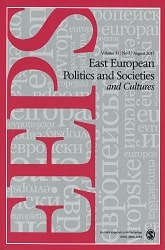Contested Constitutions. Legitimacy of Constitution-making and Constitutional Conflict in Central Europe
Contested Constitutions. Legitimacy of Constitution-making and Constitutional Conflict in Central Europe
Author(s): Jasper de RaadtSubject(s): History of Law, Constitutional Law, Political history, Politics and law, Post-Communist Transformation
Published by: SAGE Publications Ltd
Keywords: constitution-making; legitimacy; constitutional conflict; Central Europe; democratic consolidation;
Summary/Abstract: What were the effects of constitution-making procedures on the acceptance of the new “rules of the political game” in postcommunist Central Europe? This article sets out to scrutinise the increasingly popular claim among politicians and scholars of democratisation that inclusiveness and popular involvement in constitution-making processes enhance a constitution’s legitimacy. The concept of constitutional conflict, referring to political contestation over the interpretation and application of constitutional relations among state institutions, is introduced as a way to assess constitutional acceptance among politicians. The investigation concentrates on constitutional conflict patterns during the five years following constitution-making in seven Central European countries: Bulgaria, the Czech Republic, Estonia, Hungary, Poland, Romania, and Slovakia. Constitutionmaking procedures varied substantially among the cases, as did the intensity and timing of constitutional conflict. The article finds that differences in constitution-making procedures do not necessarily determine the legitimacy of constitutions among political elites. Instead, ambiguity on the allocation of formal competencies among political actors and increasing political tensions between pro-reform and anti-reform parties during the early 1990s proved to be more important triggers of constitutional conflict. Accordingly, studies on constitution-making and democratisation should focus less on procedural aspects and take into account the fuzziness of important constitutional provisions and the extent to which constitutions can survive periods of intense political polarisation.
Journal: East European Politics and Societies
- Issue Year: 23/2009
- Issue No: 03
- Page Range: 315-338
- Page Count: 24
- Language: English
- Content File-PDF

